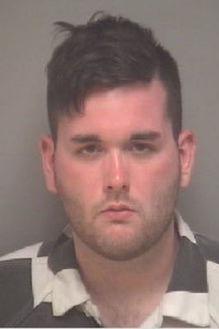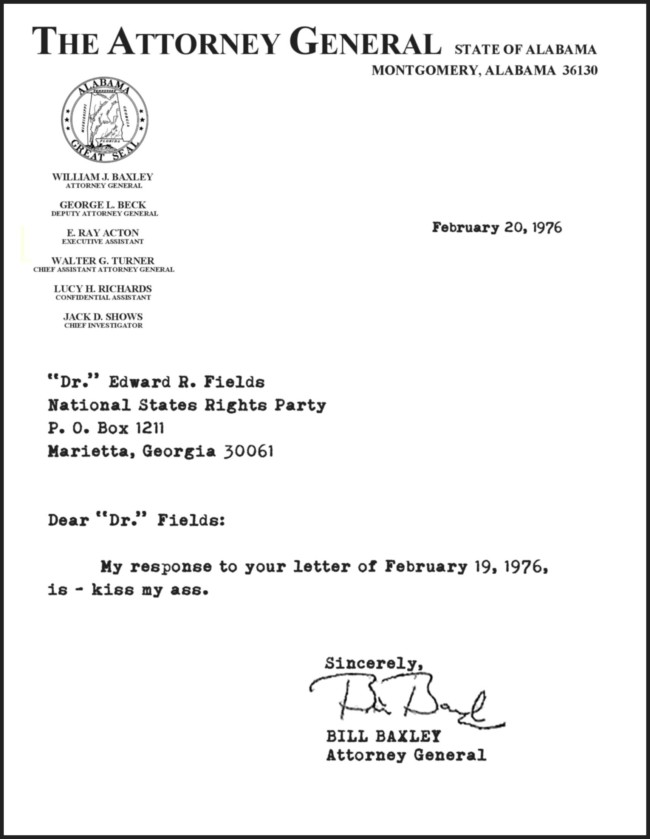Bill Baxley shames Trump: Alabama Attorney General tells the KKK to ‘kiss my ass’
President Donald Trump’s reaction to the death of Heather Heyer, 32, was lamentable, and to his many detractors illuminating. Heather Heyer, 32, from Charlottesville, was killed as Nazis, the KKK and other white supremacists clashed with counter-protestors in the city. Heyer was allegedly mowed down by a car driven by James Alex Fields Jr, 20, who has been charged with her murder. Nineteen other people were injured, some seriously, as the vehicle ploughed into anti-fascists.
Trump blamed “many sides” for the “egregious display of hatred, bigotry and violence” in Charlottesville. “It’s been going on for a long time in our country,” said Trump. “Not Donald Trump. Not Barack Obama. This has been going on for a long, long time.”
Trump did not condemn what was obviously a fascist gathering. It’s easy – and right – to bash Trump over his reluctance to call out racists. (It’s less simple to bash the liberal society which has wallowed in identity politics for so long, encouraging everyone to view life through the prism of racial and gender identity.)
Lindsey Graham, a Republican senator who ran against Mr Trump for the party’s presidential nomination, winces. He reasons that Trump “missed an opportunity to be very explicit here… These groups seem to think they have a friend in Donald Trump.” He’s not wrong. David Duke, a former leader of the Ku Klux Klan, chimes: “We’re going to fulfil the promises of Donald Trump [to] take our country back.”
As Trump forgets to mention white supremacists at the white supremacists rally – whoops! – we hark back to one man who never forgot.
Trump’s no Bill Baxley.
On February 28 1976, Bill Baxley (born June 27, 1941), Attorney General of Alabama (1971 – 1979), replied to a letter from white supremacist Edward R. Fields – founder of the National States’ Rights Party and Grand Dragon of the New Order Knights of the Ku Klux Klan.
In 1971 Baxley had ordered the law to look again at the bombing of 16th Street Church – on Sunday September 15 1963 at 10:22 am four African-American girls (Addie Mae Collins, 14, Carol Denise McNair, 11, Carole Robertson, 14, and Cynthia Wesley, 14) were murdered in a racially motivated attack.
In 1968, the FBI had closed their investigation into the bombing without filing charges against any of their named suspects, Thomas Edwin Blanton, Jr., Herman Frank Cash, Robert Edward Chambliss and Bobby Frank Cherry. The files were sealed by order of J. Edgar Hoover. Baxley had been a student at the University of Alabama when he heard about the bombing in 1963, and in 1977 recollected: “I wanted to do something, but I didn’t know what.”
When Baxley took office he wrote the names of those girls on a small telephone calling card. In 2014, he told NPR why:
“I want to be reminded that before my term was over, I wanted to try to solve that case and do something about the people who killed the little girls. It took us a couple of years to really get on the trail of the right people. And when we finally got on the right group – Robert Chambliss and his group. He was the ringleader. He was responsible for 30 or 40 bombings over a two or three-decade period in Birmingham. His nickname was ‘Dynamite Bob’ and he was very proud of it. So then around about ’76, it got public that we were for the first time looking at that case and making some real progress.”
That’s when Edward R. Fields put pen to paper.
“Well, I took it as a threat,” said Baxley. “He called me a traitor to my race and how dare I prosecute or investigate these white Christian patriots and blah, blah, blah, blah. And so they demanded a response. So I sat down and wrote them a response.”
In 1977, Robert Chambliss was tried and convicted of the first degree murder of Carol Denise McNair. Thomas Blanton and Bobby Cherry were each convicted of four counts of murder and sentenced to life imprisonment in 2001 and 2002 respectively, whereas Herman Cash, who died in 1994, was never charged with his alleged involvement in the bombing.
PS: Where were the police? An eyewitness recalls:
“There was no police presence. We were watching people punch each other; people were bleeding all the while police were inside of barricades at the park watching… I’ve seen how the police have managed crowds here in Madison, Wisconsin — huge rallies with opposing sides. I’d like to know how the police in Virginia could be so impotent. Are they so afraid of being accused of doing something wrong that they protect themselves by doing nothing?”
Spotter: Flashbak
Posted: 14th, August 2017 | In: Key Posts, News, Politicians 0 Comments | TrackBack | Permalink





